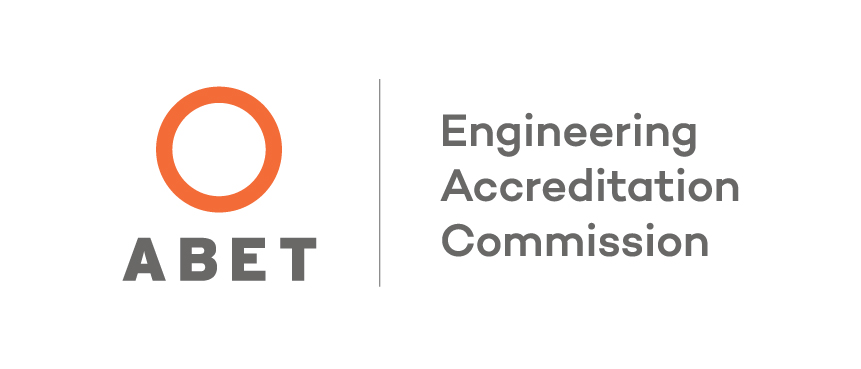Accreditation
Civil Engineering Program

The Civil Engineering (B.S.) degree program is accredited by the Engineering Accreditation Commission(s) of ABET, under the General Criteria and Program Criteria for Civil and Similarly Named Engineering Programs. The ABET accreditation process, a voluntary, non-governmental process of peer review, helps assure quality in educational programs. ABET-accredited educational programs must meet certain defined standards.
Civil Engineering Program Mission
The Civil Engineering Program will prepare students for professional performance in the global society and for life long development in the civil engineering profession through a comprehensive, forward-looking and broad-based curriculum in civil engineering emphasizing fundamentals and practical applications, oral and written communication skills, computer applications skills, and professional practice issues and ethics.
Program Educational Objectives
Graduates of the civil engineering program are able to apply their scientific and technical knowledge base as they progress along their career in civil engineering as evidenced by:
- having passed the FE and/or PE examinations
- having led a small design team
- being able to independently assess others' work
- being able to integrate their own work with the work of others
- keeping up with technological advances
Graduates of the civil engineering program are able to identify, formulate, develop, and execute practical, innovative, high quality, and cost efficient solutions for civil engineering problems as evidenced by:
- having led or managed a project from start to finish
- having developed some creative design or construction ideas that were ultimately adopted
- having completed the design and/or the construction of a significant project that was well put-together
Graduates of the civil engineering program are ethical professionals who are able to function as part of a professional enterprise while protecting human health and welfare and the environment in a global society as evidenced by:
- an understanding of and the ability to apply design codes
- a recognition and an understanding of the regulatory environment
- having maintained active membership in professional societies
- an awareness of current trends and future opportunities in local, regional, and global issues
- an active involvement in organizations that promote global societal well-being
Graduates of the civil engineering program are professionals whose growth through continuing education, professional development, and professional licensure has positioned them to have a positive impact on regional, national, and global professional communities as evidenced by:
- a pursuit of advanced education
- keeping up with continuing education requirements
- having held leadership positions in professional societies
- having exhibited leadership in community involvement through participation in civic/social activities and organizations
- positive experiences involving networking with clients
Graduates of the civil engineering program are professionals who develop individual and team skills to maximize the benefits of their engineering education by applying it in actual situations as evidenced by:
- an ability to communicate clearly
- assignment to a leadership or management role
- an ability to resolve conflicts in a group or team setting
- an ability to apply their knowledge in practical situations
- involvement with company marketing and sales operations
Student outcomes
Consistent with the program educational objectives listed above, the Missouri S&T civil engineering program graduate will have:
- an ability to identify, formulate, and solve complex engineering problems by applying principles of engineering, science, and mathematics
- an ability to apply engineering design to produce solutions that meet specified needs with consideration of public health, safety, and welfare, as well as global, cultural, social, environmental, and economic factors
- an ability to communicate effectively with a range of audiences
- an ability to recognize ethical and professional responsibilities in engineering situations and make informed judgments, which must consider the impact of engineering solutions in global, economic, environmental, and societal contexts
- an ability to function effectively on a team whose members together provide leadership, create a collaborative and inclusive environment, establish goals, plan tasks, and meet objectives
- an ability to develop and conduct appropriate experimentation, analyze and interpret data, and use engineering judgment to draw conclusions
- an ability to acquire and apply new knowledge as needed, using appropriate learning strategies
- design a system, component, or process in at least two civil engineering contexts
- explain basic concepts in project management, business, public policy, and leadership; analyze issues in professional ethics, and explain the importance of professional licensure

Follow Civil, Architectural and Environmental Engineering